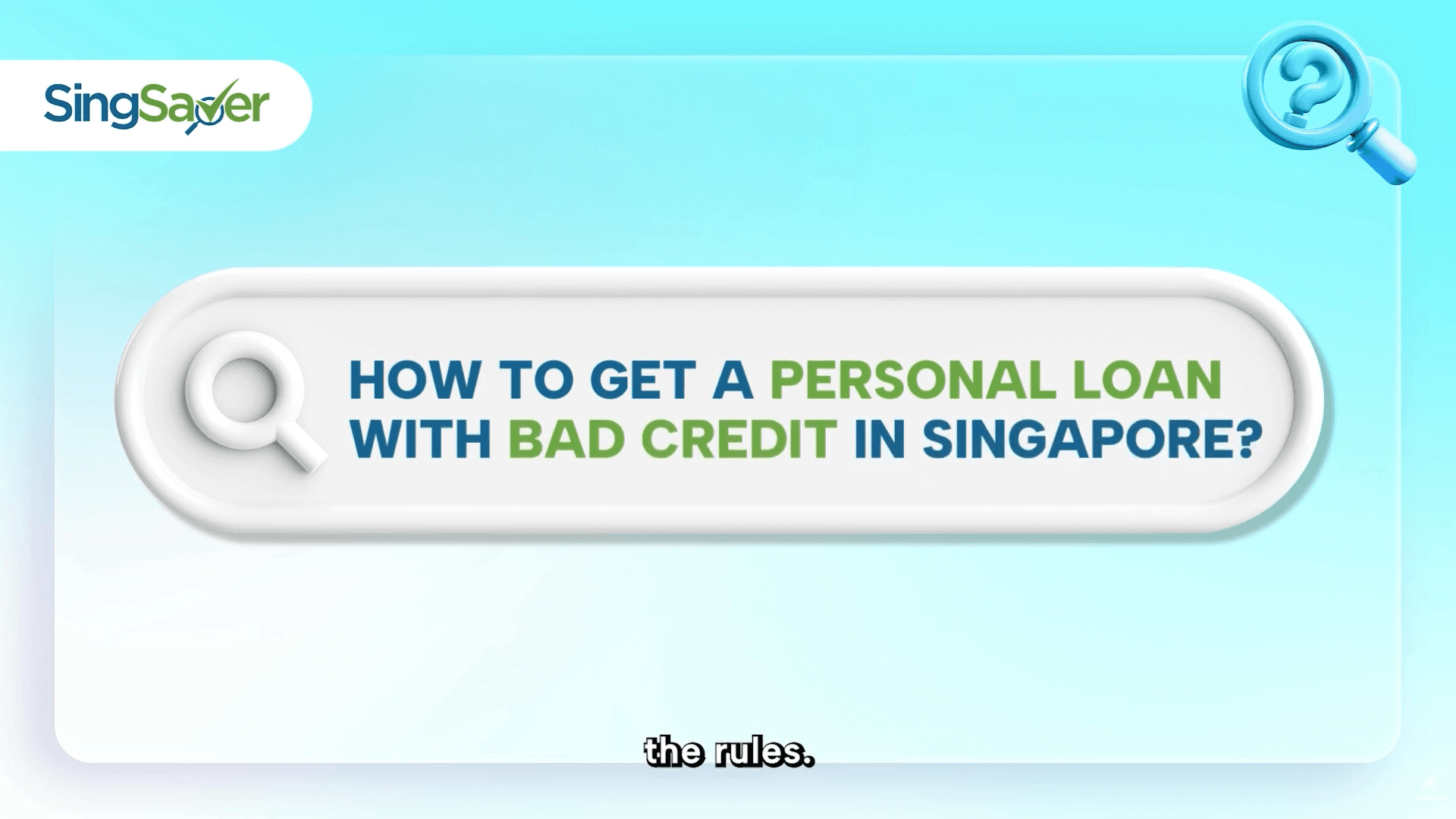How to Get a Personal Loan With Bad Credit in Singapore
Updated: 20 Feb 2026
Written bySingSaver Team
Team

The information on this page is for educational and informational purposes only and should not be considered financial or investment advice. While we review and compare financial products to help you find the best options, we do not provide personalised recommendations or investment advisory services. Always do your own research or consult a licensed financial professional before making any financial decisions.
Have a low or bad credit score in Singapore? While it doesn’t prevent you from obtaining a personal loan, you may need to take extra steps to qualify.
Here are the key steps to applying for a personal loan on bad credit and tips to boost your chances of approval or a better rate. We’ve also included alternatives you can explore so you can secure the financial backing needed to handle an emergency situation or consolidate your debts.
» COMPARE: Best loans for bad credit in Singapore
How to check your credit rating in Singapore
Checking your credit score is crucial before applying for a loan, as lenders use it to assess your loan eligibility by checking if you meet their minimum requirement. You can obtain your credit report from credit bureaus like Credit Bureau Singapore (CBS) for a nominal fee.
Credit scores in Singapore range from 1000 (rated HH; highest probability of defaulting on repayment) to 2000 (rated AA; lowest probability of defaulting on repayment), with a higher score and rating being better. Credit scores of 1000 to 1812 (rated HH to EE) are generally seen as bad credit scores but individual lenders may have their own minimum credit score requirements as well.
When reviewing your credit report, pay attention to key factors like outstanding debts/overdue balances, repayment history, previous inquiries, and unauthorised inquiries. If you spot any discrepancies, address them by disputing errors directly with the credit bureau and focusing on improving your financial habits.
CBS occasionally offers free credit reports to help you keep track of your financial standing. Check their page for the latest updates.
How to get a personal loan in Singapore with bad credit
1. Assess your overall financial standing
Before applying for a personal loan in Singapore, it's essential to thoroughly review your income, existing debt, and expenses. This comprehensive assessment will help you determine how much you can realistically afford to borrow and repay from a lender.
Financial institutions and authorised moneylenders generally look out for whether you have sufficient income to cover existing expenses and payments in addition to a new loan payment. If you have several debts, for example, but are able to keep up with repayments due to a larger income, this may be seen as an acceptable debt-to-income ratio (DTI).
If you can budget for loan repayments alongside your regular savings and emergency expenses, you may be able to comfortably take on multiple personal loans at once.
2. Calculate your loan costs and monthly payments
A personal loan calculator can help you estimate your potential monthly installments. Keep in mind that factors like the loan amount, effective interest rate (EIR), and loan tenure will all impact your repayment affordability.
Licensed moneylenders in Singapore have capped interest rates (up to 4% per month) and fees, as stipulated by the Moneylenders Act. However, do check with the individual lender what the EIR will be and whether it may change over the repayment period. This will help ensure that the estimated repayments fit comfortably within your budget to avoid financial strain.
3. Compare bad credit lenders and check your eligibility
When seeking loans for poor credit, it's important to understand the different types of lenders in Singapore. These include banks, credit unions, and licensed moneylenders. Each type of lender has their own requirements and standards for eligibility as well as repayment, so you may be able to get a better rate after doing your research.
Always review lender requirements for personal loans before applying. Consider factors such as:
-
Eligibility criteria: Lenders may have varying criteria for what constitutes a ‘bad’ credit score. Some lenders may offer loans to those with lower credit scores in the HH to EE range, others may not.
-
Loan specifics: Interest rates, loan terms, and approval speed all vary across lenders. Compare the details to find one that best suits your financial situation and needs. While interest rates are capped at 4% for licensed moneylenders, lenders may also cap the loan amount depending on your creditworthiness. Repayment terms may also vary which is why it’s important to look at your EIR.
Consider the 5 things to look out for when applying for a personal loan so you’re fully aware of what you’re applying for. Be cautious of unlicensed lenders, and always refer to the Ministry of Law’s list of licensed moneylenders.
» MORE: Compare personal loans in Singapore in 2025
Prequalification for personal loans is not common in Singapore, but some banks and financial institutions do offer it as a service. This usually involves a soft credit check, which won’t impact your overall credit score. If possible, use pre-qualification tools to obtain interest rate and loan amount estimates from different lenders, and compare them to get the best possible rate.
Finding the right lender in Singapore for bad credit loans
Here's a comparison of lenders in Singapore for borrowers with a poor credit history:
|
Lender |
Product name |
Annual interest rate |
Processing fee |
|
Credible.sg |
Credible Personal Loan |
14% |
5% of total loan amount |
|
CIMB |
CIMB Personal Loan |
2.8% |
N/A |
|
Standard Chartered |
Standard Chartered CashOne Personal Loan |
1.9% |
N/A |
|
HSBC |
HSBC Personal Loan |
2.92% |
N/A |
|
UOB |
UOB Personal Loan |
2.88% |
N/A |
|
Citi |
Citi Quick Cash - New Loan Customers |
3.45% |
N/A |
Note that banks may accept borrowers with higher risk profiles, but more factors are taken into consideration before approval. The annual interest rate is also generally lower, with potentially higher loan amounts.
Licensed moneylenders may approve loans for individuals with bad credit, but interest rates tend to be higher, though capped by the Moneylenders Act, and loan amounts lower.
4. Prepare the required documents for a loan application
Before applying for your personal loan, make sure you have all of the following documents necessary to expedite the process:
-
NRIC (National Registration Identity Card)
-
Proof of income (CPF contribution history, payslips, or tax statements)
-
Recent bank account statements
-
Employment verification (if applicable)
Bank requirements may differ slightly from moneylenders' requirements, so it's always best to check with the specific lender.
5. Apply for your loan and await approval
You can apply for a personal loan online or in person. Approval timelines vary; banks may take a few business days to a week, while licensed moneylenders may grant instant or same-day approval.
Keep in mind that banks typically conduct a hard credit check via the Credit Bureau Singapore (CBS) which may extend the approval process as well as temporarily lower your credit score.
Once you’ve received the loan agreement, always carefully and thoroughly review all of its terms before accepting. The loan amount typically arrives within several days of accepting the agreement.
Need the funds to embark on your next step in life?
Explore the top personal loans in Singapore with personalised loan rate estimates from licensed lenders.
Expected interest rates for a loan with bad credit in Singapore
Personal loan interest rates and terms in Singapore depend on factors such as your credit score, lender policies, and other financial factors.
Borrowers with lower credit scores typically face the following challenges:
-
Higher interest rates: Lenders often charge higher interest rates/EIR to borrowers with bad credit to compensate for the increased risk.
-
Lower loan amounts: Lenders may approve smaller loan amounts for borrowers with bad credit due to concerns about repayment capacity.
-
Shorter repayment periods: Lenders may offer shorter repayment periods to borrowers with bad credit, resulting in higher monthly installments.
Here's an estimated comparison of personal loan interest rates in Singapore based on credit score categories:
|
Credit score category |
Score range |
Effective interest rate |
|
HH |
1000-1723 |
Highest |
|
GG |
1724-1754 |
|
|
FF |
1755-1781 |
|
|
EE |
1782-1812 |
|
|
DD |
1813-1824 |
Moderate |
|
CC |
1825-1843 |
|
|
BB |
1844-1910 |
Lower |
|
AA |
1911-2000 |
How to improve your loan approval chances with bad credit in Singapore
Borrowers with low credit scores in Singapore can still improve their chances of securing a personal loan through these strategies:
-
Add a guarantor or joint applicant: Some lenders allow a guarantor (co-signer) or joint borrower with better credit to improve approval chances. This is especially useful if you’re applying for a personal loan without income proof. A guarantor typically has no access to the loan amount, but commits to repaying the loan if the principal borrower is unable to. A joint borrower has shared access to the loan amount, sharing joint responsibility with the principal borrower. This individual should be a trusted friend or family member.
-
Consider a secured loan: Using collateral (e.g., fixed deposits or property) may help secure approval or lower interest rates for a secured loan, as opposed to an unsecured loan. However, if you fail to repay a secured loan, your collateral may be seized and your credit score may be negatively impacted.
-
Declare all income sources: Non-salary income such as rental income, CPF contributions, or alimony can strengthen loan applications. Be as transparent about your financial situation as possible to get the optimal loan terms.
-
Request a smaller loan amount: Applying for a loan within affordable repayment limits increases approval chances.
» MORE: Understand the Do’s and Don’ts of applying for a personal loan
Where to get a personal loan with bad credit in Singapore
Banks
Some banks in Singapore may offer personal loans to borrowers with lower credit scores. However, approval will depend on factors such as income, employment status, and repayment history.
Licensed moneylenders
Licensed moneylenders, regulated by the Ministry of Law, may be more willing to approve loans for poor credit, and within a shorter timeline including immediate disbursement. This includes credit unions, although this may require membership with the organisation. However, it's important to note that interest rates are capped at 4% per month leading to higher EIR.
Fintech platforms
Some fintech platforms like MoneyIQ, Lendela, or Credit Culture can help borrowers compare loan offers from various lenders, including funding societies who may be more open to lending to individuals with bad credit.
Singer-savvy tip
When applying for a loan, be aware that some lenders may charge an origination fee. This fee is typically a fixed percentage of the loan amount and can be deducted from the loan before it's disbursed or added to your Equated Monthly Installments (EMI). Always factor in any and all fees when calculating the total cost of your loan to get the most accurate EMI and EIR numbers.
⚡SingSaver x SCB CashOne Personal Loan Flash Deal⚡
Enjoy SCB's Lunar New Year Interest Rate starting from 1.08% p.a. (EIR from 2.09%), the lowest in the market! Plus, get up to S$4,900 in Cashback when you apply for Standard Chartered CashOne Personal Loan via SingSaver. Valid till 1 March 2026. T&Cs apply.
Bad credit loans to avoid in Singapore
While financial circumstances may sometimes compel us to borrow a personal loan even while on bad credit, it’s still important to execute due diligence. Applying for the wrong loan option can trap borrowers in debt, worsening your overall financial situation.
Unlicensed moneylenders ("Ah Longs")
Avoid borrowing from illegal loan sharks, also known as "Ah Longs". These predatory lenders often charge exorbitant interest rates and may resort to harassment or intimidation tactics to enforce repayment. Always check the Ministry of Law's list of licensed moneylenders when applying for any loan.
High-Interest Short-Term Loans
While some licensed moneylenders offer short-term fast cash loans or payday loans, these can still be costly due to the high interest rates (up to 4% per month). Be wary of lenders who promise "no-credit-check" loans, as these are often predatory and may come with hidden fees and unfavorable terms. Repeatedly refinancing such loans can result in a high EIR, leading you to pay more in interest than the original loan amount.
» MORE: Compare the four types of personal loans in Singapore
Alternatives to personal loans for bad credit in Singapore
If you do not qualify for personal loans due to bad credit, here are some alternatives to payday or fast cash loans to consider.
Government financial assistance programmes: Singapore offers several government-backed financial aid programmes designed to support individuals facing financial distress. This includes ComCare Assistance, which provides cash assistance and other support for low-income individuals and families; Silver Support Scheme, which provides quarterly cash supplements to eligible retired seniors; and MOE Tuition Fee Loan & Study Loan Schemes to support students enrolled in MOE-subsidised post-secondary education programmes.
Negotiating with creditors: If you're struggling to make payments, consider working with your existing creditors, such as banks, credit card companies, or landlords. They may be willing to offer restructured payment plans or temporary relief options, such as loan deferments. If you’re dealing with medical bills in particular, options like MediFund or hospital payment plans can offer payment assistance.
» MORE: Best ways to pay medical bills in Singapore
Family or employer loans: Borrowing from family, friends, or employers can be an interest-free alternative to traditional loans. However, it's advisable to create a formal legal agreement to ensure a smooth repayment process and protect interests on both sides of the contract.
» MORE: What to know about “borrowing” your child’s savings account
Buy Now, Pay Later (BNPL) services: Consider using Singapore-based BNPL services (e.g., Atome, Grab PayLater, and ShopBack PayLater) for smaller and larger purchases, depending on the platform’s offerings. These services often don't involve traditional loans or credit checks although you may need to pay some upfront costs before beginning regular installments.
» MORE: Compare popular Buy Now, Pay Later platforms in Singapore
Debt Consolidation Plans (DCPs): Several banks in Singapore offer DCPs, which allow borrowers to combine multiple debts into a single, structured repayment plan with potentially lower interest rates.
» MORE: Learn what Debt Consolidation Plans (DCPs) are and how they work
Pawn loans and secured credit: Pawnbrokers or secured credit lines (e.g., using fixed deposits as collateral) can be options for urgent, short-term financing, especially if you have difficulty securing unsecured loans.
» MORE: Explore top debt management plan companies in Singapore in 2025
How to spot loan scams in Singapore
Unfortunately, you may encounter scammers in the process of seeking out personal loans while having bad credit. Here are some common personal loan scams and suspicious signs to be on the lookout for:
-
Unsolicited loan offers via calls, SMS, or WhatsApp: Be wary of receiving random messages from unknown lenders offering fast, no-credit-check loans. These are often scams that entrap you into debt or may even steal your financial information.
-
Upfront fees before loan disbursement: Licensed moneylenders in Singapore do not require upfront payments before loan approval. Any request for upfront fees is a red flag.
-
Guaranteed approval without credit checks: Legitimate lenders should always assess your financial status before granting a loan. Be cautious of any lender promising guaranteed approval without checking your credit.
-
Loans from unlicensed moneylenders ("Ah Longs"): Always verify that a moneylender is licensed by checking the Ministry of Law's list of licensed moneylenders. Avoid borrowing from unlicensed moneylenders and Ah Longs as they operate illegally. Be aware of common tactics from Ah Longs and loan sharks in Singapore.
Suspicious online advertisements and social media promotions: Be cautious of too-good-to-be-true loan offers on social media platforms like Facebook, Instagram, or Telegram. These ads often promise instant loans with minimal requirements, which are often scams.
Frequently asked questions about how to get personal loans for bad credit
In Singapore, "bad credit" typically refers to a low credit score rated HH up to EE. While there's no single definition of ‘bad’ credit and lenders have their own respective minimum rating requirements, a score below a certain threshold can make it more challenging to secure credit.
Bad credit can make lenders hesitant to approve a loan application as they indicate a higher risk of defaulting on payments to lenders. If the personal loan is approved, borrowers with bad credit may face higher EIR, lower loan amounts, and shorter repayment periods.
Secured loans, co-signed loans, and joint loans may be easier to obtain with bad credit. Secured loans use collateral, while co-signed and joint loans involve another person with better credit. In the event that payments can’t be made, the collateral will be seized or the guarantor or joint applicant will be responsible for repayment.
Factors that can disqualify you from getting a personal loan include a crest score that’s too low, insufficient income, excessive outstanding debts, or a short or non-existent credit history. If you check your personal loan application and see a rejection you can contact the lender to ask why before seeking out a different lender or improving your loan application.
The loan amount you can borrow with bad credit varies depending on the lender and your financial situation. Generally, lenders may offer smaller loan amounts to borrowers with bad credit.

Want to improve your credit rating to improve your chances of loan approval?
Learn top tips for building your credit score and securing your financial future.
Relevant articles
How to Get a Personal Loan In Singapore With a Bad Credit Score
Best Loans to Help Improve Bad Credit Score in Singapore (2020)
Stay ahead in everything finance
Subscribe to our newsletter and receive insightful articles, exclusive tips, and the latest financial news, delivered straight to your inbox.
Compare personal loan lenders in Singapore
Find the best personal loan lenders for you
About the author
SingSaver Team
At SingSaver, we make personal finance accessible with easy to understand personal finance reads, tools and money hacks that simplify all of life’s financial decisions for you.


